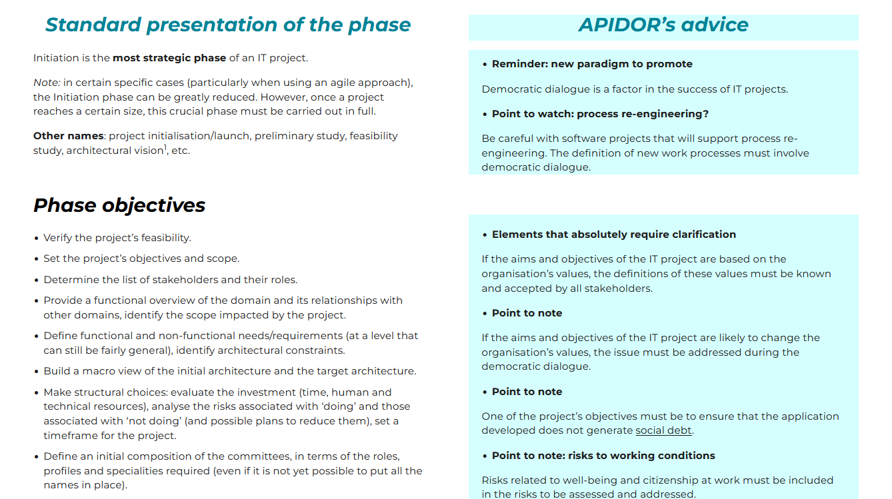The APIDOR method : Overview
The APIDOR method
APIDOR is a method for supporting IT projects through democratic dialogue. It is based on a risk prevention approach, particularly in terms of health and well-being at work, by promoting democratic dialogue during digital projects.
APIDOR considers democratic dialogue to be an integral part of digital project management. This means that those involved in democratic dialogue are considered to be full participants in the digital project and can therefore cooperate with other parties (financial decision-makers, digital specialists, stakeholders in the relevant field, etc.).
APIDOR is positioned as a tool to facilitate mediation between the ‘traditional’ stakeholders in the digital project and those responsible for well-being and citizenship at work, with the aim of ensuring that the system developed guarantees the well-being at work of those who will use it and, more broadly, contributes to the performance of the organisation.
APIDOR is a ‘toolbox’ type method: each of its components, and even each of the recommendations it offers, can be used independently of the method.
Democratic dialogue around digital technology in general, and during IT projects in particular, is underutilised in organisations and remains poorly understood. APIDOR can support organisational learning around this dialogue, targeting both those involved in democratic dialogue and decision-makers and stakeholders typically involved in digital technology.
Who is APIDOR for?
It is for those who believe that organisational performance is not achieved by intensifying work methods, but by improving well-being and quality of life at work. In other words, it is for those who do not see performance and quality of life at work as mutually exclusive.
For those who believe that there is no reason to ignore the expertise of non-experts, nor to consider that only experts have the ability to make appropriate decisions.
For those who believe that rights and duties within an organisation are inseparable and that understanding digital systems is a prerequisite for participating in their development and implementation.
For those who recognise that information systems convey the semantics of an organisation — that is to say, the meaning it gives to its very existence.
For those within organisations who believe that digital systems can be inclusive, socially responsible and sustainable, but who do not know how to develop them in this way.
APIDOR can help users of digital systems, IT professionals who design and maintain them, senior and middle management, employee representatives and external digital service providers to build responsible and sustainable digital systems.
Contents of the APIDOR method
The method consists of several chapters (on the website: pages).
Two introductory chapters present the fundamentals of APIDOR and the key elements of IT project management.
⇒ The fundamentals of APIDOR are set out in its Way of Thinking, which includes the following sections:
⇒ The key points in IT project management are detailed as follows:
-
- Impact of the application (project objective) on work processes
- Needs/requirements (functional, non-functional)
- Application design methods: different life cycle models
- Digital project stakeholders, committees (with a note on the distinction between project ownership and project management)
- Debts that an IT project can generate (technical debt, social debt)
A guide to successful democratic dialogue during an IT project, organised into eight chapters/pages:
⇒ Advice common to all IT projects for conducting democratic dialogue:
-
- The role of democratic dialogue in IT projects
- Stakeholders and bodies (committees)
- Some important points for conducting democratic dialogue
- Categories used during the project (users, non-functional requirements, etc.), examples of requirements about well-being and citizenship at work
- Project steering system
- Project timeline, organisational learning
⇒ A chapter/page of advice for each phase of the project, supplemented by a chapter/page on agile approaches.
Each phase covers the following points: phase objectives, challenges for management, phase inputs and outputs, stakeholders involved, phase content, information generally disseminated/processed.
Each phase, as well as the agile approaches, is divided into two parts (see an excerpt from the Initiation phase below):
-
- the left-hand side presents the phase in a standard format in several points
- the opposite side, on the right, contains APIDOR’s advice for conducting a democratic dialogue for each point.

Please note that the method does not distinguish between different levels of democratic dialogue intensity in the advice it provides (this will be included in a future version).
Consequently, some suggestions are relatively straightforward to implement, while others necessitate a comprehensive embrace of the issues surrounding democratic dialogue on digital technology by the organisation.
The current version of APIDOR is version 1.
All your comments and suggestions are welcome …as long as they are constructive!
Please do not hesitate to contact us.
A project supported by ANACT (France)
The APIDOR method was developed as part of a project supported by the French National Agency for the Improvement of Working Conditions (ANACT) in response to the call for expressions of interest entitled ‘Developing technological social dialogue at work’.